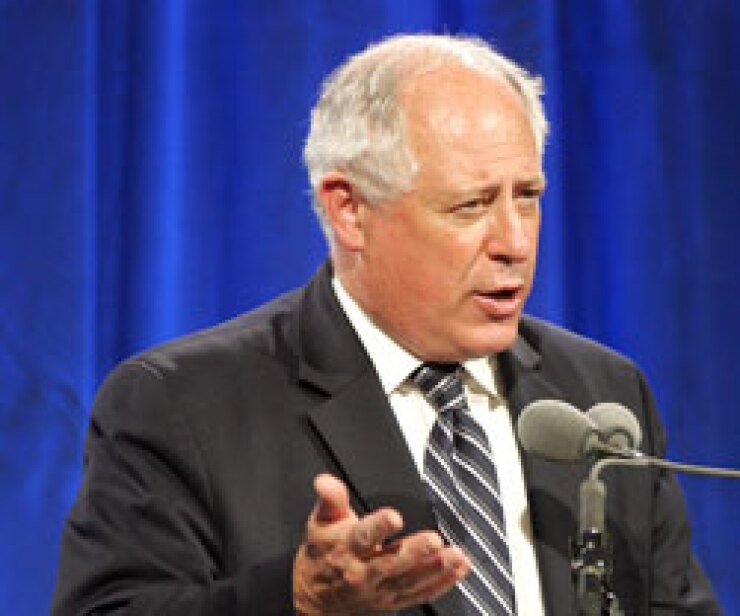
CHICAGO — A fiscal meltdown awaits Illinois in the coming years as its bill backlog rises from $9.2 billion this year to $34.8 billion in fiscal 2017 unless state lawmakers take action to rein in growing pension and Medicaid costs, a government research organization warned Monday.
The Chicago Civic Federation projects the state will close out fiscal 2012 on June 30 owing as much as $9.2 billion in unpaid bills. That figure rises to $34.8 billion in five years based on anticipated increases in Medicaid, health care, and pension payments and the expected drop in revenue after a portion of a nincome tax increase expires, said the federation’s Institute for Illinois’ Fiscal Sustainability.
The warning came in the group’s state budget road-map report that presents an overview of the state’s current fiscal condition, looks at the mounting woes over the next five years and offers recommendations to help mend the fiscal sore spots. It comes ahead of Gov. Pat Quinn’s annual state of the state address on Wednesday and the unveiling of a fiscal 2013 budget later in February.
“The governor and General Assembly must act now,” said federation chief Laurence Msall. “Failure to address unsustainable trends in the state’s pension and Medicaid systems will only result in financial disaster for the state of Illinois.”
The fiscal 2012 backlog includes about $5.7 billion in general fund-supported bills and vouchers and another $3.6 billion in unpaid obligations that include corporate tax refunds, Medicaid payments, and employee and retiree health insurance bills. Most state retirees make no payments toward health care costs.
Quinn continues to press lawmakers to support a borrowing plan to pay down the backlog but lawmakers have so far resisted. The federation opposes the proposal. “The state cannot afford any additional borrowing for operations or to pay down its backlog of bills,” the report says.
Quinn has appointed a pension reform group to recommend changes that he and legislative leaders have said they are a priority during the upcoming legislative session. The governor issued a statement pointing to measures adopted over the last two years to help improve state finances and pledging to take further steps. “Gov. Quinn’s budget plan for fiscal year 2013 will continue to make the tough decisions necessary to address the state’s financial challenges. It will also demonstrate his long-standing commitment to creating jobs and investing in education, while protecting public safety and our most vulnerable residents,” the statement read.
Illinois’ challenges prompted Moody’s Investors Service to lower its rating on $27 billion of GO debt one notch, to A2 with a stable outlook. Fitch Ratings affirmed its A credit and stable outlook while Standard & Poor’s affirmed its A-plus rating and negative outlook.
The state’s operating budget is also headed further into the red. An estimated $508 million operating deficit in the fiscal 2012 $33.6 billion budget could rise to $3.2 billion in fiscal 2017. “The state of Illinois’ continued practice of spending more than it takes in and pushing operating expenses into future fiscal years is a growing threat to our most vulnerable social service providers, local governments and anyone doing business with the state of Illinois,” Msall said.
The strain will grow in the coming years as a portion of the tax increase is phased out. The state raised the corporate rate from 4.8% to 7.0% and the flat personal income tax rate from 3% to 5% in 2011 to generate an estimated $6.8 billion more annually. The personal income tax rate is set to decline to 3.75% beginning in 2015 and to 3.25% in 2025, while the corporate rate falls to 5.25% in 2015 and returns to 4.8% in 2025.
The federation primarily attributes the state’s skyrocketing bill backlog to an “unsustainable” rise in Medicaid costs, which account for about $21 billion of the estimated $34.8 billion figure. The federation recommends the state aggressively implement reforms passed last year while also eliminating programs not eligible for federal reimbursement and reducing prescription drug costs.
Rising pension payments also will pressure the state’s books, leaving it to push other bills aside. Pension-related costs — including statutory payments to the systems and debt service on pension bonds — will rise from $5.7 billion in fiscal 2012 to $7.8 billion in fiscal 2017.
The report notes that the state will pay a total of $382 million in interest for its five-year 2010 $3.5 billion pension bonds and another $1.3 billion for its eight-year, $3.7 billion 2011 issue. The bonds covered the state’s pension payments in those respective fiscal years. The state’s five pension funds closed out fiscal 2011 with $82.9 billion of unfunded liabilities for a funded ratio of 43.4%.
Other recommendations to help stabilize the state’s fiscal house include limiting cost-of-living increases for retirees and current employees to match a higher threshold adopted last year for new workers and reductions in future benefits not yet earned by current employees. Retirees should also be required to help cover health insurance premiums.
The federation also called for broadening the state income tax to cover federally taxable retirement income, which could raise an estimated $1.1 billion annually based on a 3% personal tax rate. The state also should also raise its 98-cents-per-pack cigarette tax to $1.98 to generate $307 million a year, the group said.





